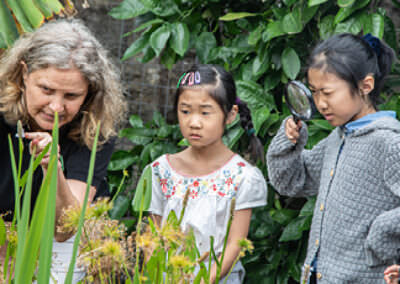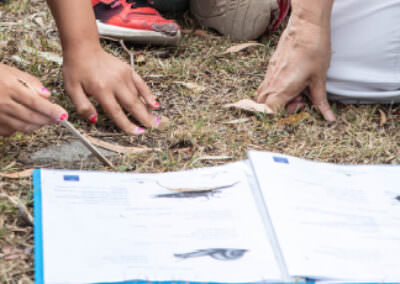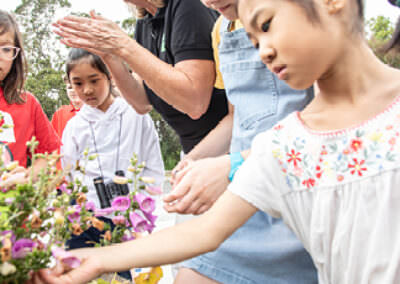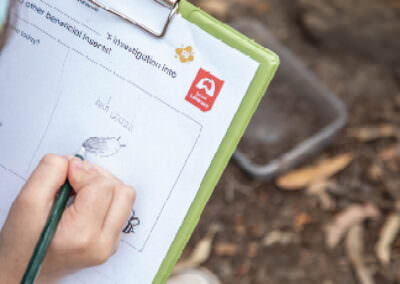LEARNING ACTIVITY
STORY
Suyin loves spending time at her grandparents’ farm. Her grandparents have lots of fruit trees, and in the spring the blossoms are out and the grapefruit are ready to pick. Suyin and her grandparents are not the only ones who like to eat from the trees; so do some of the insects! Her grandfather points out some insects to Suyin with his magnifying lens. They watch the bees and ladybugs up close who are busy working to help keep the garden healthy.

We’re going to investigate insects! Explore your outdoor surroundings to see if your habitat is home to bees and other beneficial insects. Use the field guide to help you get the buzz on bees and other local insects.
For children to:
- look closely for beneficial insects outdoors and identify those which are present
- understand the important role that bees and other insects play in the environment.
Insects are likely to be more visible in temperatures above 20⁰ C. Some insects will go into diapause, similar to hibernation to avoid extreme cold or heat.
Introduction
To increase your chances of observing beneficial insects carefully consider the suitability of the observation site and the current conditions. Optimal conditions for bee observations:
- an area that is home to native and exotic flowering species
- area protected from strong winds
- an open sunny location
- a warm location with temperatures above 20⁰ C
- between 10am and 2pm when the flowers open up wide to invite the bees in.
*Time allocation will be dependent on site selection and travel time.
Checklist
Instructions

Step 1
Why bees matter: Discuss the important role bees play in pollinating flowering plants and shrubs. As pollinators bees carry pollen from flower to flower to help the flowering plants make seeds, reproduce and make new plants. Bees help to grow our food. Without pollinators such as bees, animals and humans would be without seeds, nuts and fruits to eat.
What makes other insects beneficial: Discuss the role insects play as decomposers, pollinators and as a food source for insectivores.

Step 2
Examine your chosen field guide with the children (device or printed version) prior to exploring outside. Point out a beneficial insect they are likely to observe and model how to use the field guide.
Outline safety aspects to the children, when observing insects.
- Be gentle and quiet observers. Do not touch any insects.
- Instruct how to use the garden trowels or spoons and paddle sticks or paintbrushes.
- Guide the children to tread lightly, taking care not to stand on anything living while exploring.
- Ask the children to return things back to how they found them, e.g. turned rocks or logs.

Step 3
Head outside to your observation site. Insects are everywhere but finding a spot near a garden bed or away from asphalt will allow children the opportunity to do some light digging.
Allow children time for ‘slow looking’ in a micro environment. Encourage the children to explore the site, carefully looking at different locations using their senses to lead them.
Carefully look at flowers to see if there are any active bees or other flying insects. Use the trowels or spoons to gently turn over the topsoil, bark, small rocks and leaf litter looking for ground dwelling insects. Using the paddle sticks or paintbrushes, attempt to move the insects into the plastic container to observe.
If the children are successful at spotting an insect, see if they can identify the insect using their field guide.

Step 4
Use the activity sheet to encourage the children to make careful observations and thoughtful interpretations during and after the activity.
You might like to take photos to capture your observations.
Extension Activity
Bees are most busy in spring; discuss why that might be so.
Discuss actions that you could take to attract native bees and other beneficial insects to your school or backyard. Watch this Gardening Australia clip with native bee researcher Kit Prendergast.
Curriculum and Framework Links
SCIENCE – See Australian Curriculum information flyer (pdf)
Foundation: ACSSU002 (AC9S1U01), ACSIS011(AC9SFI02), ACSSU004 (AC9S1U02),
Year 1: ACSSU211(AC9S1U01), ACSSU017 (AC9SFU01), ACSIS025 (AC9S1I02; AC9S2I02)
Year 2: ACSSU030 (AC9S3U01), ACSIS042 (AC9S1I06; AC9S2I06)
CROSS CURRICULUM PRIORITY
Sustainability
THE EARLY LEARNING YEARS FRAMEWORK
Outcome 2
MY TIME OUR PLACE: FRAMEWORK FOR SCHOOL AGE CARE
Outcome 2
Reference List
ONLINE RESOURCES
Museum Victoria has developed a free National Field Guide app for Android and Apple devices. There are 8 apps available so choose one best suited to your location (NSW, ACT, VIC, SA, NT, QLD, WA & TAS).
Download the Urban Wildlife app for free to help you identify beneficial insects in your area.
What are insects? and Bugwise fact sheets from the Australian Museum.
Explore bugs and insects from Backyard Buddies.
PRINTABLE RESOURCES
The Australian Museum has a free Bugwise Invertebrate Guide to help your children identify common spiders, insects and other invertebrates from illustrations.
Insect identification tips from the Wild Pollinator Count.
WATCH
Check out our other videos on “Getting the Buzz on Bees” and “Pollinators & Predator’s” on YouTube:
- And other beneficial plants
- What is pollination?
- Which bugs are pollinators?
- Why is biodiversity important?
- Which bugs are predators?
- Interesting facts about ants?
- What is a parasitic wasp?
Watch and learn about Australian native bees from ABC’s Gardening Australia.
PHOTO CREDITS
Photo courtesy of Julie Armstrong.
Just for Kids
Check out our fun activity The insect game – who am I?
We value your feedback
When you have finished this learning activity, please tell us what you think with our survey.
Your feedback will help Landcare Australia improve the activities in the Junior Landcare Learning Centre.
Why not try one of our other Junior Landcare learning activities?
Creating a butterfly garden
Biodiversity
Love Letters to the Land
Biodiversity|First Nations Perspectives|Food Production|Waste Management
Creating a sensory garden
Biodiversity
Understanding weeds: life cycle
Biodiversity


